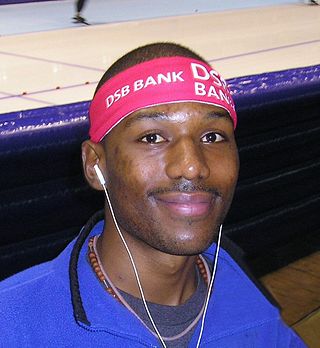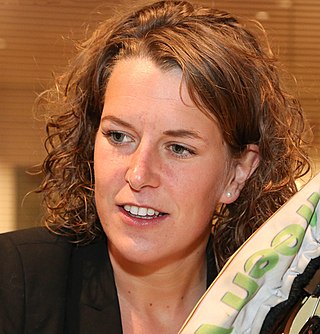
Speed skating is a competitive form of ice skating in which the competitors race each other in travelling a certain distance on skates. Types of speed skating are long track speed skating, short track speed skating, and marathon speed skating. In the Olympic Games, long-track speed skating is usually referred to as just "speed skating", while short-track speed skating is known as "short track". The International Skating Union (ISU), the governing body of competitive ice sports, refers to long track as "speed skating" and short track as "short track skating".

The 1992 Winter Olympics, officially known as the XVI Olympic Winter Games and commonly known as Albertville '92, was a winter multi-sport event held from 8 to 23 February 1992 in and around Albertville, France. Albertville won the bid to host the Winter Olympics in 1986, beating Sofia, Falun, Lillehammer, Cortina d'Ampezzo, Anchorage, and Berchtesgaden. The 1992 Winter Olympics were the last winter games held in the same year as the Summer Olympics. The Games were the fifth Olympic Games held in France and the country's third Winter Olympics, after the 1924 Winter Games in Chamonix and the 1968 Winter Games in Grenoble. This games was the first of two consecutive Olympic games to be held in Western Europe, preceding the 1992 Summer Olympics in Barcelona, Spain.
The World Allround Speed Skating Championships are a series of speed skating events held annually to determine the best allround speed skater of the world. The event is held over two days, with all skaters entering the first three distances and the best eight skaters over these distances getting to ride the last event. The results of the races are converted to points, and the skater with lowest total score wins the championship.
The World Single Distances Speed Skating Championships are a series of speed skating competitions organised by the International Skating Union.
At the 1924 Winter Olympics in Chamonix, five speed skating events were contested, all for men. The competitions were held on Saturday, January 26, 1924 and on Sunday, January 27, 1924. Charles Jewtraw won the first gold medal of the 1924 Winter Games, and Clas Thunberg and Roald Larsen each won medals in all five events, with Thunberg winning 3 gold.
At the 1932 Winter Olympics, four speed skating events were contested. For the only time in the Olympic history, the speed skating were held as pack-style events, having all competitors skate at the same time. Women were allowed to compete in speed skating for the first time in history in a set of demonstration events. The IOC was reluctant to upgrade women’s events to full medal events, although the organizing committee of the Games advocated for the full inclusion of women’s events. The distances for women were 500 m, 1000 m and 1500 m. The pack-style racing would pave the way for short track speed skating, that would debut as a demonstration event at the 1988 Winter Olympics in Calgary before becoming an official Olympic event at the 1992 Winter Olympics in Albertville.

Long-track speed skating, usually simply referred to as speed skating, is the Olympic discipline of speed skating where competitors are timed while crossing a set distance. It is also a sport for leisure. Sports such as ice skating marathon, short track speedskating, inline speedskating, and quad speed skating are also called speed skating.

Shani Earl Davis is an American former speed skater.

Arnold Clas ("Classe") Robert Thunberg was a Finnish speed skater who won five Olympic gold medals – three at the inaugural Winter Olympics held in Chamonix in 1924 and two at the 1928 Winter Olympics held in St. Moritz. He was the most successful athlete at both of these Winter Olympics, sharing the honour for 1928 Winter Olympics with Johan Grøttumsbraaten of Norway. No other athlete ever won such a high fraction of all Olympic events at a single Games. He was born and died in Helsinki.

Sven Kramer is a retired Dutch long track speed skater who has won an all time record nine World Allround Championships as well as a record ten European Allround Championships. He is the Olympic champion of the 5000 meters at the Vancouver 2010, Sochi 2014 and Pyeongchang 2018 Olympics, and won a record 21 gold medals at the World Single Distance Championships; eight in the 5000 meters, five in the 10,000 meters, and eight in the team pursuit. Kramer is the current world record holder in the team pursuit and broke the world records in the 5000 meter and 10,000 meter events three times. By winning the 2010 World Allround Championship, Kramer became the first speed skater in history to win four consecutive world allround championships and eight consecutive international allround championships. He was undefeated in the 18 international allround championships he participated in from the 2006/2007 season until the 2016/2017 season. From November 2007 to March 2009, he was ranked first in the Adelskalender, but despite his dominance as an all-round skater he has since been overtaken on that list by Shani Davis and, more recently, by his teammate Patrick Roest.

Speed skating has been featured as a sport in the Winter Olympics since the first winter games in 1924. Women's events were added to the Olympic program for the first time in 1960 Squaw Valley Olympics.

Irene Karlijn (Ireen) Wüst is a Dutch former long track speed skater of German ancestry. Wüst became the most successful speed skating olympian ever by achieving at least one gold medal in each of five consecutive Winter Olympic appearances and is the only athlete to win an individual gold medal in five consecutive Olympics, Summer or Winter.

The 500 metres speed skating event at the 1924 Winter Olympics was held on 26 January 1924 at the Stade Olympique de Chamonix in Chamonix, France. One of five speed skating races to be contested at these Games, this was the first event ever contested at the Winter Olympics. The event was won by American Charles Jewtraw who became the first Winter Olympics gold medallist.

Lee Kyou-hyuk is a South Korean retired long track speed skater who specializes in the 500 and 1,000 meters. He was the 2007, 2008, 2010 and 2011 World Sprint Speed Skating Champion and the 2011 World Champion for 500 m. He is one of four men to have won the World Sprint Speed Skating Championships four times.

Martina Sáblíková is a Czech speed skater, specializing in long track speed skating. She is an Olympic gold medal winner and a multiple European and World allround champion. She became the first Czech to win two Olympic gold medals at one Winter Games in 2010. Sáblíková also competes in inline speed skating and road cycling races as a part of her summer preparation for the skating season. In cycling, she focuses on individual time trial discipline in which Sáblíková holds multiple Czech Republic National Championships titles and belongs to the world's top 15 female time-trialists. Sáblíková is the elder sister of fellow speedskater Milan Sáblík.
Roald Morel Larsen was a World Champion speed skater from Norway. He was born in Kristiania . Roald Larsen's parents were Hans Jacob Larsen, a glazier born in Kristiania in 1870, and Lydia Larsen, born in Porsgrunn in 1865. They had four children, all sons: Jaan Harald (1891), Lyder Ragnar (1895), Roald Morel (1898), and Gelgjermo Stone (1899).
The 1500 metres speed skating event was part of the speed skating at the 1924 Winter Olympics programme. The competition was held on Sunday, January 27, 1924. Twenty-seven speed skaters from ten nations were due to compete, but five athletes withdrew, so in the end twenty-two speed skaters from nine nations competed. The Finnish athlete Asser Wallenius fell and did not finish the race.
The 5000 metres speed skating event was part of the speed skating at the 1924 Winter Olympics programme. The competition was held on Saturday, January 26, 1924. Thirty-one speed skaters from thirteen nations were due to compete, but nine athletes withdrew, so in the end twenty-two speed skaters from ten nations competed. The Canadian athlete Charles Gorman abandoned the race after the first round.
The 10,000 metres speed skating event was part of the speed skating at the 1924 Winter Olympics programme. The competition was held on Sunday, January 27, 1924. Twenty-one speed skaters from nine nations were due to compete, but five athletes withdrew, so in the end sixteen speed skaters from six nations competed. The French athlete George de Wilde abandoned the race.












